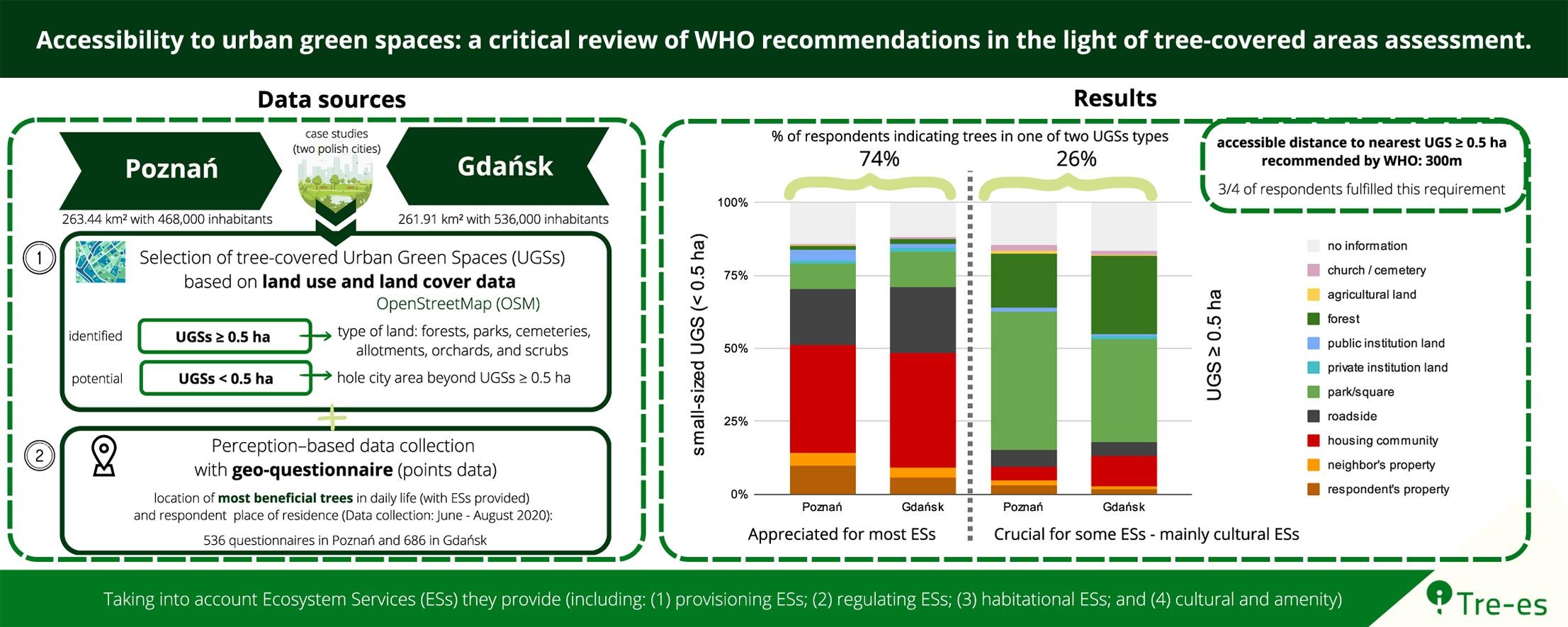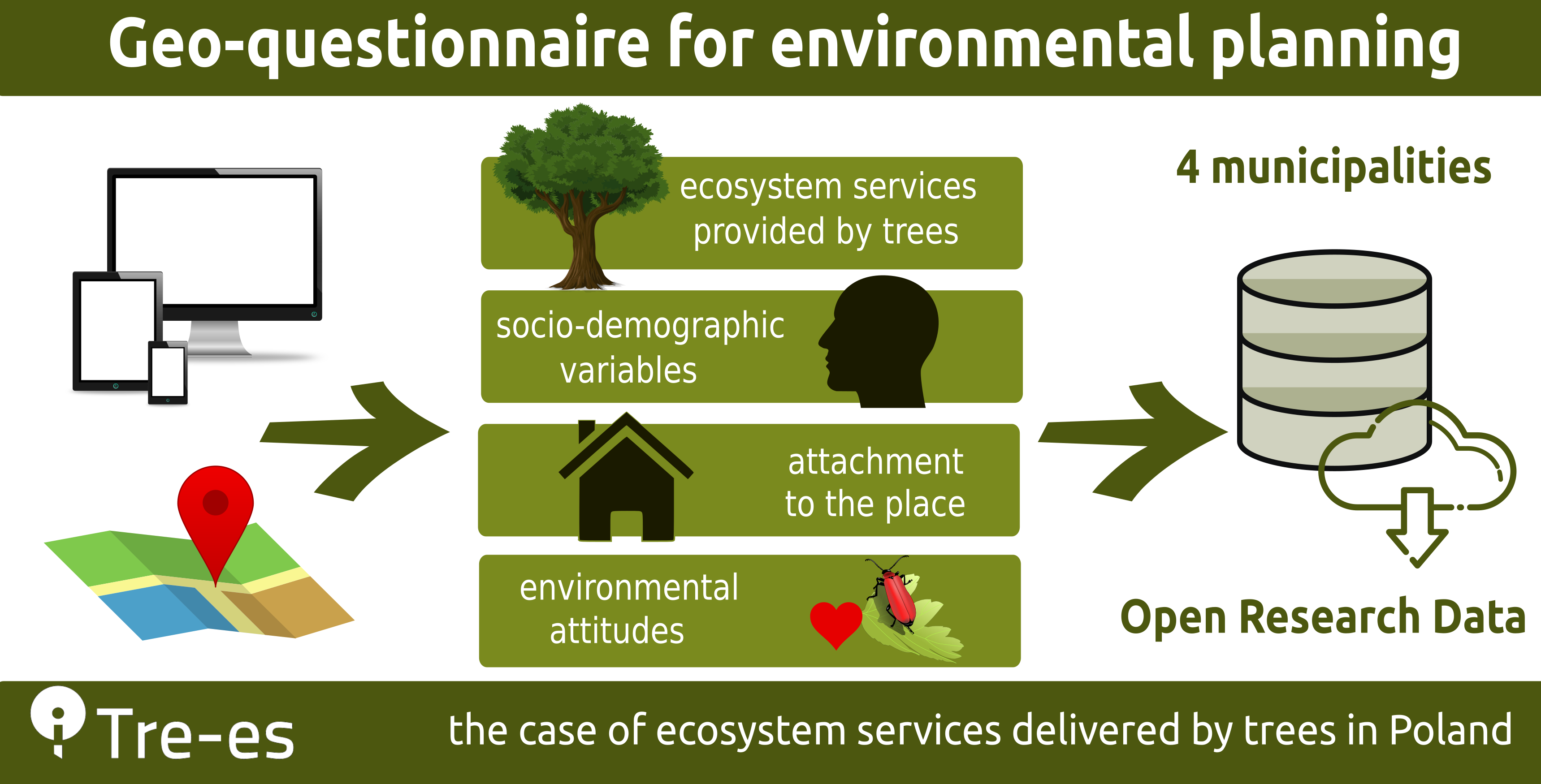In the role of: PhD student
Employed in the project: 12.2018 - 02.2021
Principal investigator: Dr hab. Piotr Matczak
Project financing institution: Narodowe Centrum Nauki
Program at the project financing institution: OPUS
Project budget: 744 145.00 PLN
Project implementation period: 01.2018 - 02.2021
Trees and shrubs provide many benefits to the inhabitants, both in the countryside and in the city. These include the following: landscape design, identity building and unique characterization of a place, air purification from gases and dusts, creation urban microclimate, water management, fostering an active lifestyle, reducing stress, stimulating social interaction, creating spatial order, creating privacy and comfort. These benefits are often treated as taken for granted and costless. However, the number of trees in many localities in Poland is decreasing, which aggravates the inhabitants’ ability to use nature.
An important element in the management of green areas is the cutting down, replacement and planting of trees and shrubs. The cutting down of trees is governed by the law specifying the procedures and conditions necessary for obtaining permits. Each municipality annually issues permits (in thousands) for the removal of trees or shrubs from the property, upon the request of inhabitants. Trees are an example of public and environmental good, requiring the creation of standards in order to protect them.
In 2017 changes in legislation have taken place, which resulted in a sharp increase in the cut. The exact scale and impact of this on benefits provided by trees and shrubs is unknown, and the purpose of our study is to investigate the consequences of the changes that have occurred.
The subject of the research in this project is how the changes in the regulations governing the cutting down affect the decisions of the inhabitants; what effect does cutting down trees by inhabitants bring from the point of view of the benefits provided by the trees and shrubs; what are the social preferences for constraints imposed on inhabitants’ decisions, in terms of trees on private (non-commercially) land. In addition, we check whether the use of the method of group debate can affect social preferences. According to the opinion poll, half of the Poles support restrictions on the right of private inhabitants to cut down trees, while the other half supports a liberal view, with no restrictions. This is a contentious issue, and this project explores issues that are being discussed scientifically and which are important for social life.
1. Accessibility to urban green spaces: A critical review of WHO recommendations in the light of tree-covered areas assessment.
Przewoźna P., Inglot A., Mielewczyk M., Mączka K., Matczak P. Accessibility to urban green spaces: A critical review of WHO recommendations in the light of tree-covered areas assessment.Ecological Indicators, 2024, Vol. 166., Issue 112548 https://doi.org/10.1016/j.ecolind.2024.112548
Summary article in the form of a podcast generated using the notebooklm
2. Influence of an Interview Location on Opinions About the Ecosystem Services Provided by Trees.
Matczak P., Mielewczyk M., Mączka K., Przewoźna P., Inglot A. Influence of an Interview Location on Opinions About the Ecosystem Services Provided by Trees.Quaestiones Geographicae, 2024, Vol. 43., Issue 2 https://doi.org/10.14746/quageo-2024-0022
Summary article in the form of a podcast generated using the notebooklm
3. Narratives on cutting down trees on private land. A comparison of urban and rural municipalities in Poland using the Q-deliberation method.
Mączka K., Matczak P., Mielewczyk M., Przewoźna P., Inglot A., Wężyk P., Zięba-Kulawik K., Hawryło P. Narratives on cutting down trees on private land. A comparison of urban and rural municipalities in Poland using the Q-deliberation method. Land Use Policy, 2023, 133. https://doi.org/10.1016/j.landusepol.2023.106843
Summary article in the form of a podcast generated using the notebooklm
4. Psychological and physical components in forming preferences on urban greenery management -The case of trees.
Paniotova-Mączka D., Jabkowski P., Matczak P., Przewoźna P., Mączka K., Mielewczyk M., Inglot A. Psychological and physical components in forming preferences on urban greenery management – The case of trees. Environmental Science & Policy, 2023, 145. https://doi.org/10.1016/j.envsci.2023.03.014
Summary article in the form of a podcast generated using the notebooklm
5. Ranking ecosystem services delivered by trees in urban and rural areas.
Przewoźna P., Mączka K., Mielewczyk M., Inglot A., Matczak P. Ranking ecosystem services delivered by trees in urban and rural areas. Ambio, 2022. https://doi.org/10.1007/s13280-022-01722-2
6. Geo-Questionnaire for Environmental Planning: The Case of Ecosystem Services Delivered by Trees in Poland.
Przewoźna P., Inglot A., Mielewczyk M., Mączka K., Matczak P., Wężyk P. Geo-Questionnaire for Environmental Planning: The Case of Ecosystem Services Delivered by Trees in Poland. Data, 2021, 6, 128. https://doi.org/10.3390/data6120128
7. Improving methods to calculate the loss of ecosystem services provided by urban trees using LiDAR and aerial orthophotos.
Zięba-Kulawik K., Hawryło P., Wężyk P., Matczak P., Przewoźna P., Inglot A., Mączka K. Improving methods to calculate the loss of ecosystem services provided by urban trees using LiDAR and aerial orthophotos. Urban Forestry & Urban Greening, 2021, 63, 127195. https://doi.org/10.1016/j.ufug.2021.127195
8. Use of Bi-Temporal ALS Point Clouds for Tree Removal Detection on Private Property in Racibórz, Poland.
Przewoźna P., Hawryło P., Zięba-Kulawik K., Inglot A., Mączka K., Wężyk P., Matczak P. Use of Bi-Temporal ALS Point Clouds for Tree Removal Detection on Private Property in Racibórz, Poland. Remote Sensing, 2021, 13, 767. https://doi.org/10.3390/rs13040767
9. Q-deliberacja jako metoda badania i konsultowania kwestii środowiskowych, przegląd założeń i rozwiązań praktycznych.
Mączka K., Mielewczyk M., Matczak P., Przewoźna P., Inglot A. Q-deliberacja jako metoda badania i konsultowania kwestii środowiskowych, przegląd założeń i rozwiązań praktycznych. W: „Środowisko przyrodnicze jako obszar badań” red. Adam Młynarczyk, Poznań: Bogucki Wydawnictwo Naukowe 2020, 79-93.
1. Attitudes to tree removal on private property in rural and urban Polish municipalities.
Inglot A., Przewoźna, P., Mielewczyk, M., Mączka, K., Matczak, P., & Wężyk, P. (2021). Attitudes to tree removal on private property in rural and urban Polish municipalities. (Version 1.1, 1–) [dataset]. Gdańsk University of Technology. https://doi.org/10.34808/ds29-zt75
2. Attitudes to tree removal on private properties in two Polish cities.
Inglot A., Przewoźna, P., Mielewczyk, M., Mączka, K., & Matczak, P. (2021). Attitudes to tree removal on private properties in two Polish cities. (Version 1.1, 1–) [dataset]. Gdańsk University of Technology. https://doi.org/10.34808/6d3c-qy88
3. The effect of interview location on the perception of Ecosystem Services provided by trees. A Polish case study.
Inglot A., Przewoźna, P., Mielewczyk, M., Mączka, K., & Matczak, P. (2021). The effect of interview location on the perception of Ecosystem Services provided by trees. A Polish case study. (Version 1.1, 1–) [dataset]. Gdańsk University of Technology. https://doi.org/10.34808/apm8-re13
Dr hab. Piotr Matczak - Principal investigator
Dr hab. inż. Piotr Wężyk, Prof. URK - expert
Dr inż. Paweł Hawryło - PhD student
Dr inż. Adam Inglot - PhD student
Dr Krzysztof Mączka - PhD student
Mgr Marcin Mielewczyk - PhD student
Dr inż. Patrycja Przewoźna - PhD student
Dr inż. arch. kraj. Karolina Zięba-Kulawik - PhD student

